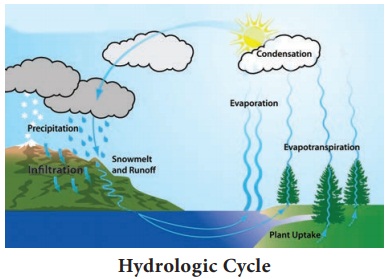Hydrologic Cycle | Chapter 3 | Geography | 8th Social Science - Hydrologic Cycle or Water Cycle | 8th Social Science : Geography : Chapter 3 : Hydrologic Cycle
Chapter: 8th Social Science : Geography : Chapter 3 : Hydrologic Cycle
Hydrologic Cycle or Water Cycle
Hydrologic Cycle or Water Cycle
Hydrology is the science which deals
with the various aspects of water such as its occurrence, distribution,
movement and properties on the planet earth. Availability of water on the earth
is not uniform. Some places are very rich and some places are poor in water
resources.
Hydrologic cycle is a global sun-
driven process where water is transported from oceans to atmosphere, from atmosphere
to land and from land back to oceans. The water cycle can be considered as a
closed system for the earth, as the quantity of water involved in the cycle is
invariable, though its distribution varies over space and time.
Evaporation takes place from the
surface water and transpiration from the plants. Water vapour gets condensed at
higher altitudes by condensation nuclei and form clouds. The clouds melt and
sometimes burst resulting in precipitation of different forms. A part of water
from precipitation flows over the land is called runoff and the other part
infiltrates into the soil which builds up the groundwater.
Hydrologic cycle is a circulation of
water. It is a continuous process and takes place naturally. The three
important phases of the hydrologic cycle are: 1) Evapotranspiration, 2)
Precipitation and 3) Runoff.

Related Topics